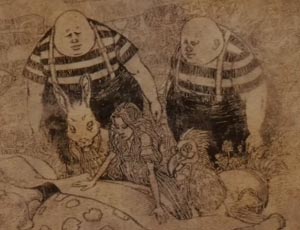|
||||||
In the Looking Glass world of Alice in Wonderland, Tweedledee’s “logic” makes perfect sense. In the real world – it’s nonsense – or to be more precise – suffers from both a formal and a non-formal logical fallacy.2 Yet it makes perfect sense to Tweedledee and Tweedledum. In the same manner, the logic of atheists makes perfect sense to them in their looking glass world where they protect themselves from the truth; they can’t see anything wrong with it – yet it is clear to others it is as fallacious as the flawed logic of Tweedledee and Tweedledum. When difficult questions are put to atheists about the nature of reality for which the atheistic worldview has no answer, atheists (and evolutionists alike) throw out fine sounding arguments. And like the Looking Glass characters, their answers have the form of validity, but upon close examination it is apparent their arguments are as fallacious as the logic used by the Tweedles. Let me give a couple of examples. Consider the question – Why is there something rather than nothing? For the Christian, there’s an easy answer: In the beginning, God created the heavens and the earth (Gen 1.1). For philosophers, it is a very deep philosophical question. In fact Martin Rees, cosmologist, astrophysicist and astronomer royal calls it the “preeminent mystery.”3 Such a formulation does not affirm the Christian worldview, but neither is it overtly antagonistic. But for particle physicist, skeptic (of the supernatural) and atheist Victor Stenger that question is:
|
||||||

